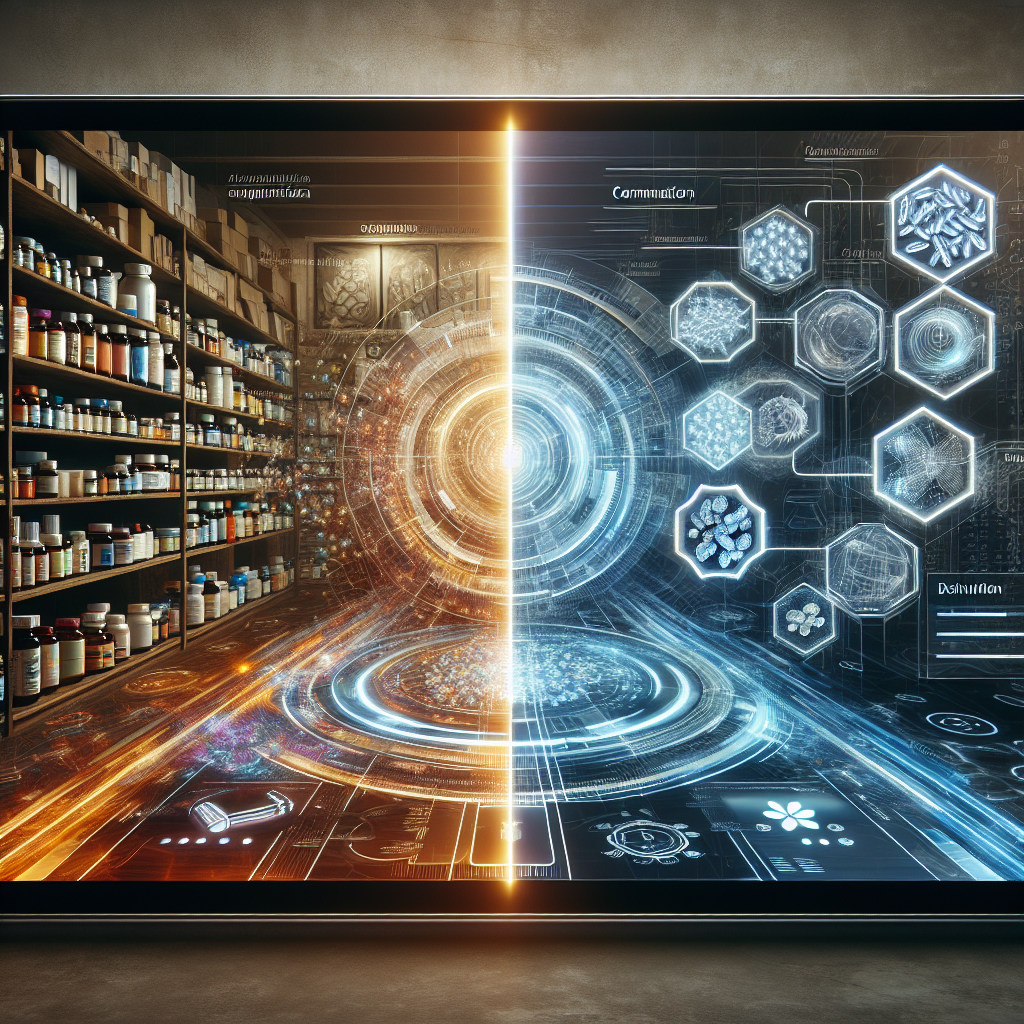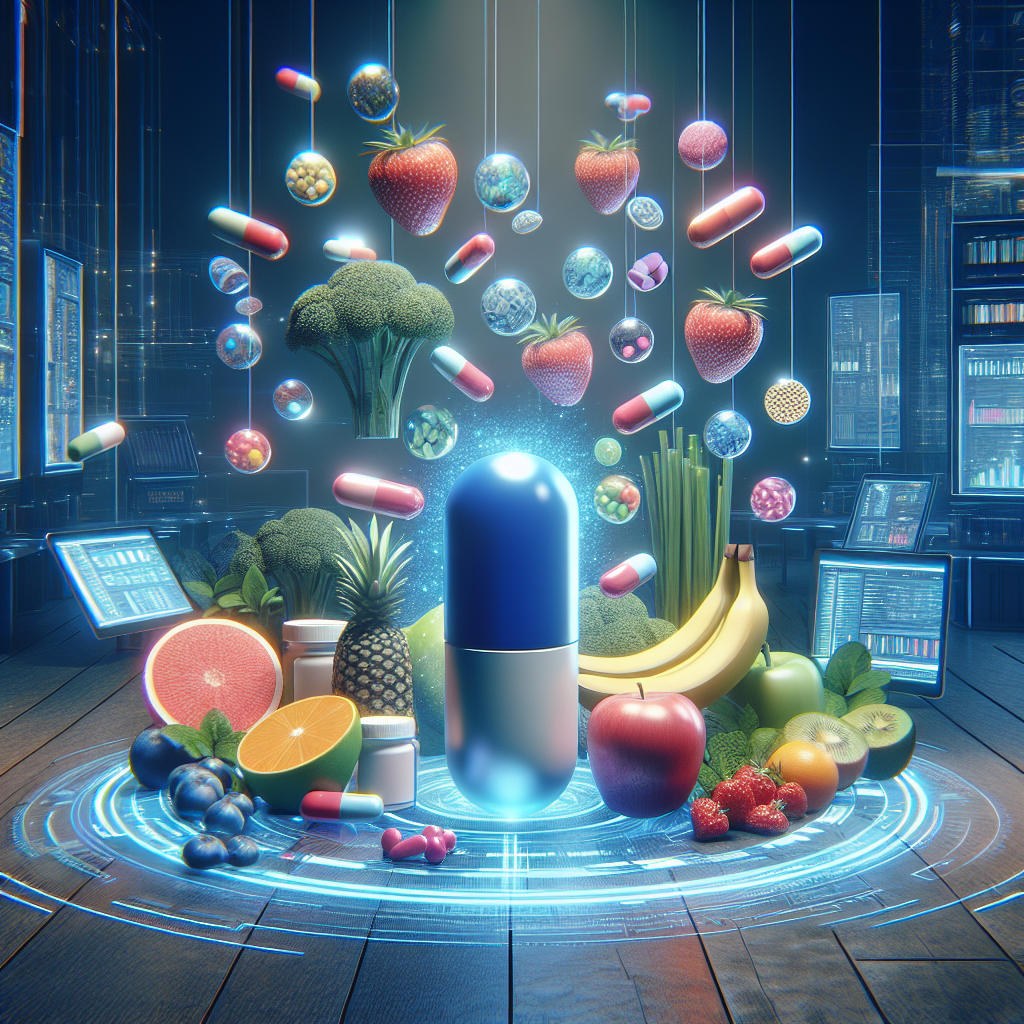The Intersection of Technology and Wellness: Vitamins

Discover the powerful intersection of technology and wellness with our range of vitamins. Enhance your health and wellbeing today. Click here to start your journey towards vibrant vitality.
Exploring the Role of Technology in Enhancing Vitamin Intake
The intersection of technology and wellness is a fascinating and rapidly evolving field, with new developments constantly emerging to enhance our health and wellbeing. One area where this intersection is particularly evident is in the realm of vitamins. Technology is playing an increasingly significant role in enhancing vitamin intake, offering innovative solutions to help us maintain optimal health.
Traditionally, vitamins have been consumed in the form of pills, capsules, or liquids. However, these methods often come with challenges such as difficulty swallowing, forgetfulness, or simply the inconvenience of having to take them at specific times of the day. Technology is now offering solutions to these challenges, making it easier and more convenient for individuals to ensure they are getting the vitamins they need.
One of the most significant technological advancements in this area is the development of smart pill dispensers. These devices not only store and dispense vitamins at pre-set times, but they also come with features such as reminders and alerts to ensure that individuals do not forget to take their vitamins. Some even have the ability to track vitamin intake and provide feedback, allowing individuals to monitor their vitamin consumption and adjust as necessary.
In addition to smart pill dispensers, technology has also made it possible to incorporate vitamins into our daily routines in more seamless ways. For instance, there are now water bottles that come with built-in vitamin dispensers, allowing individuals to consume their vitamins in the form of a flavored drink. This not only makes taking vitamins more enjoyable, but it also ensures that individuals are staying hydrated – another crucial aspect of overall health.
Moreover, the rise of wearable technology has also had an impact on vitamin intake. There are now wearable devices that can monitor various aspects of health and provide recommendations on vitamin intake based on the data collected. For example, a device might monitor an individual’s sleep patterns, physical activity levels, and diet, and then suggest specific vitamins to help improve their health based on this information.
The role of technology in enhancing vitamin intake extends beyond physical products. There are now numerous apps and online platforms that provide personalized vitamin recommendations based on individual health goals, lifestyle factors, and even genetic information. These platforms often come with features such as meal planning and tracking, making it easier for individuals to incorporate the recommended vitamins into their diets.
Furthermore, technology is also playing a role in improving our understanding of vitamins and their impact on our health. Advanced research techniques and data analysis tools are allowing scientists to study vitamins in more depth, leading to new discoveries about their benefits and potential uses. This, in turn, is leading to the development of new vitamin products and supplements that are more effective and tailored to individual needs.
In conclusion, the intersection of technology and wellness in the realm of vitamins is a testament to the incredible advancements that are being made in both fields. Through innovative products, apps, and research tools, technology is making it easier than ever for individuals to maintain optimal vitamin intake and, consequently, improve their overall health. As technology continues to evolve, we can expect to see even more exciting developments in this area in the future.
The Impact of Digital Advancements on Vitamin and Nutrient Tracking

The intersection of technology and wellness is a rapidly evolving landscape, with digital advancements playing a pivotal role in the way we understand and manage our health. One area where this is particularly evident is in the realm of vitamins and nutrient tracking. The advent of digital tools and platforms has revolutionized our ability to monitor our nutritional intake, providing us with unprecedented insights into our health and wellness.
Traditionally, tracking our vitamin and nutrient intake was a laborious process, often involving manual record-keeping and a reliance on memory. However, the digital age has ushered in a new era of convenience and accuracy. Today, we have access to a plethora of apps and devices that can automatically track and analyze our dietary habits. These tools can provide us with detailed breakdowns of our vitamin and nutrient consumption, helping us to identify any deficiencies and adjust our diets accordingly.
Moreover, these digital platforms often come equipped with extensive food databases, making it easier than ever to log our meals and snacks. By simply scanning a barcode or entering a food item, we can instantly access information about its nutritional content. This not only saves us time but also ensures that our tracking is as accurate as possible.
The impact of these digital advancements extends beyond mere convenience. By providing us with a clearer picture of our nutritional intake, they can play a crucial role in our overall health and wellness. For instance, they can help us to prevent vitamin deficiencies, which can lead to a host of health problems, from fatigue and weakness to more serious conditions like anemia and osteoporosis.
Furthermore, these tools can also aid in the management of various health conditions. For example, individuals with diabetes can use them to monitor their carbohydrate intake, while those with high blood pressure can track their sodium consumption. This can help to improve disease management and potentially reduce the need for medication.
In addition to tracking our current intake, digital tools can also provide us with personalized recommendations based on our unique needs and goals. For instance, a pregnant woman may be advised to increase her intake of folic acid, while an athlete may be recommended to consume more protein. This personalized approach can help to optimize our health and wellness, ensuring that we are getting the right nutrients in the right amounts.
However, while these digital advancements offer numerous benefits, it’s important to use them responsibly. They should not replace professional medical advice, and any significant changes to our diet should be discussed with a healthcare provider. Furthermore, it’s crucial to remember that while vitamins and nutrients are important, they are just one piece of the wellness puzzle. Regular exercise, adequate sleep, and stress management are also key components of a healthy lifestyle.
In conclusion, the intersection of technology and wellness has had a profound impact on our ability to track and manage our vitamin and nutrient intake. Through the use of digital tools and platforms, we can gain a deeper understanding of our nutritional needs, helping us to optimize our health and prevent disease. As technology continues to evolve, we can expect to see even more innovative solutions in the realm of vitamin and nutrient tracking, further enhancing our ability to take control of our wellness.
How Technology is Revolutionizing the Vitamin and Wellness Industry
The intersection of technology and wellness is a fascinating and rapidly evolving space, particularly in the realm of vitamins and dietary supplements. The vitamin and wellness industry, once dominated by traditional brick-and-mortar stores, is now being revolutionized by technology, leading to a more personalized, efficient, and effective approach to health and wellness.
One of the most significant ways technology is transforming the vitamin industry is through the advent of personalized vitamins. Thanks to advancements in technology, companies can now offer personalized vitamin packs tailored to an individual’s specific health needs and goals. This is achieved through online quizzes that assess a person’s diet, lifestyle, health concerns, and even genetic information. The data collected is then analyzed using sophisticated algorithms to recommend a personalized blend of vitamins and supplements. This approach is a far cry from the one-size-fits-all model of the past and represents a significant leap forward in the industry.
Moreover, technology has also made it easier for consumers to access information about the vitamins they are taking. With the help of mobile apps and websites, individuals can now easily research the benefits, potential side effects, and scientific evidence supporting various vitamins and supplements. This increased transparency and access to information empower consumers to make more informed decisions about their health.
In addition to personalization and increased access to information, technology is also improving the quality and efficacy of vitamins. For instance, advancements in manufacturing technologies have led to the development of more bioavailable forms of vitamins, meaning they are easier for the body to absorb and utilize. Furthermore, technology has enabled the creation of time-release vitamins that deliver nutrients to the body over an extended period, ensuring a steady supply throughout the day.
The integration of technology into the vitamin industry is not just benefiting consumers; it’s also providing valuable insights for businesses. With the help of big data and analytics, companies can gain a deeper understanding of consumer behavior, preferences, and trends. This information can be used to develop more effective marketing strategies, improve product development, and ultimately, better serve their customers.
The rise of e-commerce has also played a significant role in the evolution of the vitamin industry. Online platforms have made it easier for consumers to purchase vitamins and supplements, often at lower prices than traditional retail stores. Furthermore, subscription services offer the convenience of regular deliveries, ensuring that individuals never run out of their essential vitamins.
In conclusion, the intersection of technology and wellness in the vitamin industry is leading to a more personalized, efficient, and effective approach to health. From personalized vitamins to increased access to information, improved product quality, and the convenience of e-commerce, technology is revolutionizing the way we approach our health and wellness. As technology continues to evolve, we can expect to see even more exciting developments in the vitamin and wellness industry in the years to come.